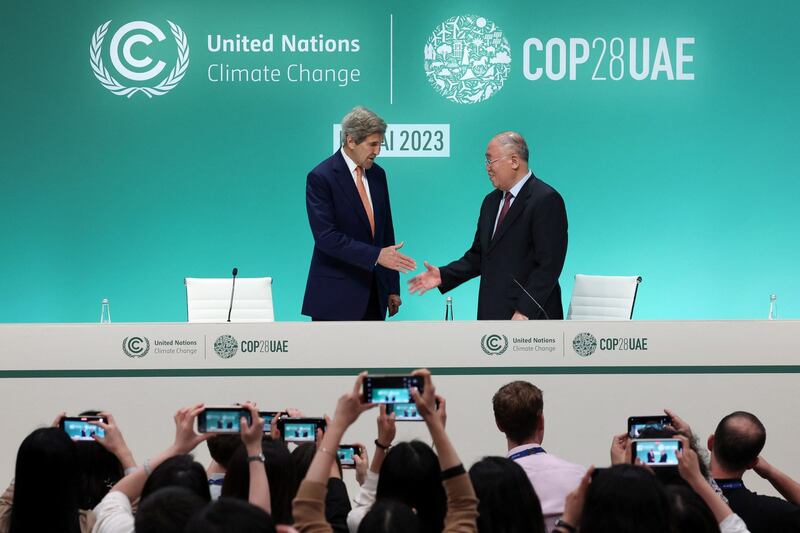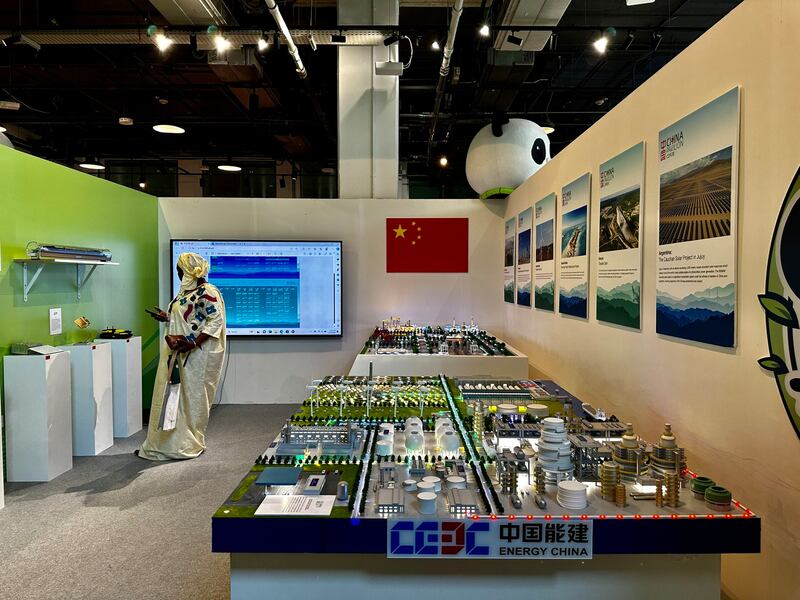In the end, Abu Dhabi oil boss Sultan Al Jaber got what he wanted: a deal on fossil fuel language at the COP28 climate summit, which he has been presiding over for the past 13 days.
The 198-country jamboree ended in Dubai on Wednesday after marathon discussions over two nights with an agreement to “transition away from fossil fuels in energy systems, in a just, orderly and equitable manner, accelerating action in this critical decade, so as to achieve net zero by 2050 in keeping with the science.”
It is the first time such language on oil and gas had been included in a COP document after nearly three decades of climate talks. However, many were left unhappy, as the text does not include the “phasing out” of fossil fuels, which more than 120 countries had hoped for.
“We didn’t want to interrupt the standing ovation when we came into the room. But we are a little confused … about what happened,” said Samoa’s lead negotiator Anne Rasmussen.
“It seems that you just gaveled the decisions, and the small island developing states were not in the room,” Rasmussen said on behalf of the Alliance of Small Island States (AOSIS), an intergovernmental climate action coalition of 39 low-lying nations, more than half from the Indo-Pacific region.

While the document contained “many good elements,” including solid references to the science, it had “a litany of loopholes” that did not deliver and did not advance “beyond the status quo,” she said.
The document is “an incremental advancement over business as usual when what we really needed is an exponential step change in our actions and support,” she said.
Her comments drew longer applause from the delegates than the first pronouncement by Jaber, who did not respond to her remarks.
‘Leaky hull full of holes’
Later, the foreign minister of the Republic of the Marshall Islands, John M. Silk, said the “fact that the decision was gaveled without a major group in the room, which represents one of the most vulnerable groups in the world, is unacceptable.”
“I came here to build a canoe together for my country. Instead, we have built a canoe with a weak and leaky hull full of holes. Yet we have to put it into the water because we have no other option,” Silk told the hall.
U.S. presidential climate envoy, John Kerry, told the plenary the applause for the AOSIS speech is “a clarion call to all of us about our obligation and responsibility” to do more on climate action as quickly as possible.

“For them, this is an immediate crisis, not something down the road or in the future. So, we will continue to press for a more rapid transition,” he later told journalists.
“We supported the call for clear language about the need to largely phase out fossil fuels. But look, given the makeup of this 195-nation entity, it’s pretty clear that was more than a steep climb,” Kerry said, adding that “there were times in the last 48 hours where some of us thought this could fail.”
The word “fossil fuel” appears just twice in one page in an 11,000-page final document.
China: developed countries historically responsible
The final, legally non-binding document on the global stocktake was approved, albeit 24 hours overtime, with references to global greenhouse gas emissions needing to be cut by 43% by 2030, compared to 2019 levels, but noting that the world is way off track.
The document calls for tripling the deployment of renewable power and action on methane by the end of the decade. However, it also approved the use of transitional fuels like carbon-emitting natural gas.
Jaber called the document “an enhanced, balanced -- but make no mistake -- historic package to accelerate climate action.”
Nithi Nesadurai, director and regional coordinator for Climate Action Network Southeast Asia, said the document “provides a clear and strong signal to the fossil fuel industry and fossil fuel producing countries … to initiate the just transition process for phasing out fossil fuels.”
“Missing in the text was the means of implementation for developing countries, including finance, capacity building and technology transfer, based on equity. This lets rich countries in the Global North, primarily responsible for the climate crisis, off the hook,” he told RFA.
“Further, the inclusion of false solutions such as carbon capture and storage, nuclear, and other removal technologies provide loopholes for countries to purposely distract from the single focus of phasing out fossil fuels.”

The concerns of the developing countries were not addressed at COP28, the head of the Chinese delegation alleged.
“It is regrettable that in the current … process, the many important concerns of the developing countries have not been taken into full account and resolved,” Zhao Yingmin, China’s vice-minister of ecology and environment, told the plenary.
He said that developed countries have “unshakable historical responsibility for climate change” and so must take the lead ahead of the rest of the world to reduce emissions as soon as possible and substantively.
They should also “deliver without delay financial, technical and capacity building support for developing countries to ensure global just transition … and more positively respond to their concerns,” he said, adding climate action “must feature both ambition and pragmatism.”
“The key is still pragmatic actions and delivering on the commitments and means of implementation that match the ambition,” he said.
ASEAN states and COP28
Several delegates from the Southeast Asian countries spoke at the plenary hall, reserving notes of concern.
“The specific language on transitioning away from fossil fuel must be understood in the context of different national circumstances, pathways, and approaches in line with the principle of the Paris Agreement,” a delegate from Indonesia said.
“Indonesia would not accept less than that for our future.”
Indonesia ranks among the top global coal exporters. Coal constitutes approximately 60% of the nation’s electricity production, but it has promised to phase out coal power plants and stopped issuing new licenses.
“Keeping the 1.5 degrees Celsius [goal of limiting global warming] alive can only be done with action. We could not cover this goal simply by new and additional ambition alone. We need concrete implementation,” she said.
The Philippines has secured a seat on the inaugural board of the loss and damage fund, the operation of which was agreed upon at the beginning of this COP, representing the Asia Pacific Group. It has already offered to be the host venue for the fund.
The Filipino delegate said the global stocktake “did not result in a stronger outcome on matters relating to equity.”
“We reiterate that nothing in this decision diminishes the existing obligation of developed countries … and does not impose conditionalities upon developing countries to access the funds,” she said.

Climate Action Network Southeast Asia's Nithi, who has been to COP since 2000, said the outcome of this year’s climate summit “is helpful for Southeast Asia, where nine countries have declared net zero emissions target between 2050 and 2065.”
“They should use the decision to fix their phase-out date for fossil fuels in their long-term low emissions development strategies and work towards achieving it.”
In Southeast Asia, countries are in differing stages of development, from developed Singapore to two least developed countries, Laos and Myanmar, while three -- Brunei, Indonesia and Malaysia -- produce fossil fuels
“Based on the principle of equity, countries in a stronger economic position should already begin transitioning away from fossil fuels in a just and equitable manner,” Nithi said.
“This includes accelerating the implementation of renewable energy solutions, which will also provide energy security,” he added.
Edited by Joshua Lipes.
